I have the following code in C whith the violation of MISRAC:2012 Rule 4.1 (i.e., Octal and hex adecimal escape sequences shall be terminated). I have not clear which is the right Compliant Solution to solve this following code.
static const char rcsid[] = "\n@(#) $Revision: 243501 $\n";
and
rerrs[] = {
{ REG_NOMATCH, "REG_NOMATCH", "llvm_regexec() failed to match" },
{ REG_BADPAT, "REG_BADPAT", "invalid regular expression" },
{ REG_ECOLLATE, "REG_ECOLLATE", "invalid collating element" },
{ REG_ECTYPE, "REG_ECTYPE", "invalid character class" },
{ REG_EESCAPE, "REG_EESCAPE", "trailing backslash (\\)" },
{ REG_ESUBREG, "REG_ESUBREG", "invalid backreference number" },
{ REG_EBRACK, "REG_EBRACK", "brackets ([ ]) not balanced" },
{ REG_EPAREN, "REG_EPAREN", "parentheses not balanced" },
{ REG_EBRACE, "REG_EBRACE", "braces not balanced" },
{ REG_BADBR, "REG_BADBR", "invalid repetition count(s)" },
{ REG_ERANGE, "REG_ERANGE", "invalid character range" },
{ REG_ESPACE, "REG_ESPACE", "out of memory" },
{ REG_BADRPT, "REG_BADRPT", "repetition-operator operand invalid" },
{ REG_EMPTY, "REG_EMPTY", "empty (sub)expression" },
{ REG_ASSERT, "REG_ASSERT", "\"can't happen\" -- you found a bug" },
{ REG_INVARG, "REG_INVARG", "invalid argument to regex routine" },
{ 0, "", "*** unknown regexp error code ***" }
};
About this one the Understand tool of Scitool says the violation is in line 58:
all code for the second violation is
*-
* This code is derived from OpenBSD's libc/regex, original license follows:
*
* Copyright (c) 1992, 1993, 1994 Henry Spencer.
* Copyright (c) 1992, 1993, 1994
* The Regents of the University of California. All rights reserved.
*
* This code is derived from software contributed to Berkeley by
* Henry Spencer.
*
* Redistribution and use in source and binary forms, with or without
* modification, are permitted provided that the following conditions
* are met:
* 1. Redistributions of source code must retain the above copyright
* notice, this list of conditions and the following disclaimer.
* 2. Redistributions in binary form must reproduce the above copyright
* notice, this list of conditions and the following disclaimer in the
* documentation and/or other materials provided with the distribution.
* 3. Neither the name of the University nor the names of its contributors
* may be used to endorse or promote products derived from this software
* without specific prior written permission.
*
* THIS SOFTWARE IS PROVIDED BY THE REGENTS AND CONTRIBUTORS ``AS IS'' AND
* ANY EXPRESS OR IMPLIED WARRANTIES, INCLUDING, BUT NOT LIMITED TO, THE
* IMPLIED WARRANTIES OF MERCHANTABILITY AND FITNESS FOR A PARTICULAR PURPOSE
* ARE DISCLAIMED. IN NO EVENT SHALL THE REGENTS OR CONTRIBUTORS BE LIABLE
* FOR ANY DIRECT, INDIRECT, INCIDENTAL, SPECIAL, EXEMPLARY, OR CONSEQUENTIAL
* DAMAGES (INCLUDING, BUT NOT LIMITED TO, PROCUREMENT OF SUBSTITUTE GOODS
* OR SERVICES; LOSS OF USE, DATA, OR PROFITS; OR BUSINESS INTERRUPTION)
* HOWEVER CAUSED AND ON ANY THEORY OF LIABILITY, WHETHER IN CONTRACT, STRICT
* LIABILITY, OR TORT (INCLUDING NEGLIGENCE OR OTHERWISE) ARISING IN ANY WAY
* OUT OF THE USE OF THIS SOFTWARE, EVEN IF ADVISED OF THE POSSIBILITY OF
* SUCH DAMAGE.
*
* @(#)regerror.c 8.4 (Berkeley) 3/20/94
*/
#include <sys/types.h>
#include <stdio.h>
#include <string.h>
#include <ctype.h>
#include <limits.h>
#include <stdlib.h>
#include "regex_impl.h"
#include "regutils.h"
#ifdef _MSC_VER
#define snprintf _snprintf
#endif
static const char *regatoi(const llvm_regex_t *, char *, int);
static struct rerr {
int code;
const char *name;
const char *explain;
} rerrs[] = {
{ REG_NOMATCH, "REG_NOMATCH", "llvm_regexec() failed to match" },
{ REG_BADPAT, "REG_BADPAT", "invalid regular expression" },
{ REG_ECOLLATE, "REG_ECOLLATE", "invalid collating element" },
{ REG_ECTYPE, "REG_ECTYPE", "invalid character class" },
{ REG_EESCAPE, "REG_EESCAPE", "trailing backslash (\\)" },
{ REG_ESUBREG, "REG_ESUBREG", "invalid backreference number" },
{ REG_EBRACK, "REG_EBRACK", "brackets ([ ]) not balanced" },
{ REG_EPAREN, "REG_EPAREN", "parentheses not balanced" },
{ REG_EBRACE, "REG_EBRACE", "braces not balanced" },
{ REG_BADBR, "REG_BADBR", "invalid repetition count(s)" },
{ REG_ERANGE, "REG_ERANGE", "invalid character range" },
{ REG_ESPACE, "REG_ESPACE", "out of memory" },
{ REG_BADRPT, "REG_BADRPT", "repetition-operator operand invalid" },
{ REG_EMPTY, "REG_EMPTY", "empty (sub)expression" },
{ REG_ASSERT, "REG_ASSERT", "\"can't happen\" -- you found a bug" },
{ REG_INVARG, "REG_INVARG", "invalid argument to regex routine" },
{ 0, "", "*** unknown regexp error code ***" }
};
/*
- llvm_regerror - the interface to error numbers
= extern size_t llvm_regerror(int, const llvm_regex_t *, char *, size_t);
*/
/* ARGSUSED */
size_t
llvm_regerror(int errcode, const llvm_regex_t *preg, char *errbuf, size_t errbuf_size)
{
struct rerr *r;
size_t len;
int target = errcode &~ REG_ITOA;
const char *s;
char convbuf[50];
if (errcode == REG_ATOI)
s = regatoi(preg, convbuf, sizeof convbuf);
else {
for (r = rerrs; r->code != 0; r++)
if (r->code == target)
break;
if (errcode®_ITOA) {
if (r->code != 0) {
assert(strlen(r->name) < sizeof(convbuf));
(void) llvm_strlcpy(convbuf, r->name, sizeof convbuf);
} else
(void)snprintf(convbuf, sizeof convbuf,
"REG_0x%x", target);
s = convbuf;
} else
s = r->explain;
}
len = strlen(s) + 1;
if (errbuf_size > 0) {
llvm_strlcpy(errbuf, s, errbuf_size);
}
return(len);
}
/*
- regatoi - internal routine to implement REG_ATOI
*/
static const char *
regatoi(const llvm_regex_t *preg, char *localbuf, int localbufsize)
{
struct rerr *r;
for (r = rerrs; r->code != 0; r++)
if (strcmp(r->name, preg->re_endp) == 0)
break;
if (r->code == 0)
return("0");
(void)snprintf(localbuf, localbufsize, "%d", r->code);
return(localbuf);
}
